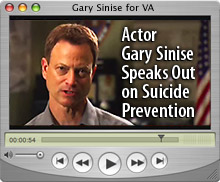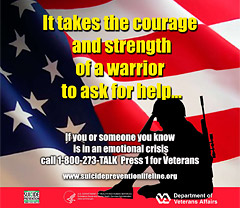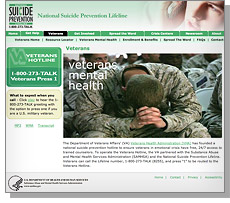|
Mental Health
|
Suicide Prevention
Suicide Prevention is everyone's business, and VA is enhancing its efforts in this vital area of veteran health.
Know the Signs
Watch for these key suicide warning signs, and provide the Lifeline number to anyone exhibiting them.
- Talking about wanting to hurt or kill oneself
- Trying to get pills, guns, or other ways to harm oneself
- Talking or writing about death, dying or suicide
- Hopelessness
- Rage, uncontrolled anger, seeking revenge
- Acting in a reckless or risky way
- Feeling trapped, like there is no way out
- Saying or feeling there's no reason for living.
How to recognize when to ask for help (MS Word) Signs, Myths and Realities
Outreach
 During National Suicide Prevention Week Sept. 7-13, 2008 VA will release a nationwide Public Service Announcement featuring actor Gary Sinise, who portrayed a suicidal veteran that is saved in the movie Forrest Gump. Another announcement featuring newswoman Deborah Norville is being developed to reach the family members of veterans. During National Suicide Prevention Week Sept. 7-13, 2008 VA will release a nationwide Public Service Announcement featuring actor Gary Sinise, who portrayed a suicidal veteran that is saved in the movie Forrest Gump. Another announcement featuring newswoman Deborah Norville is being developed to reach the family members of veterans.- VA Under Secretary for Health Dr. Michael J. Kussman sent a personalized letter to all veterans, asking them to call VA for help if they are undergoing an emotional crisis.
- VA will also expand on a recently released pilot project for a display advertising campaign that debuted in the metropolitan Washington, D.C., area. The ads are designed to make veterans and their family members aware of the VA Suicide Prevention Lifeline1-800-273-TALK (8255), which is available around-the-clock, seven days a week.
- VA has sponsored two Suicide Prevention Days and placed announcements about suicide prevention and the VA Lifeline on the main VA website as well as on the web pages of medical facilities.
 VA also has been distributing brochures, wallet cards, bumper magnets, key chains and stress balls to veterans, their families and VA employees to promote awareness of the Lifeline number and educate its employees, the community and veterans about how to identify and help those who may be at risk. VA also has been distributing brochures, wallet cards, bumper magnets, key chains and stress balls to veterans, their families and VA employees to promote awareness of the Lifeline number and educate its employees, the community and veterans about how to identify and help those who may be at risk.
|
|

Suicide Prevention Website
This link leads outside the VA website; VA is not responsible for external content.
|
Toll-Free Suicide Prevention Lifeline
1-800-273-TALK (8255)
Suicide Prevention Lifeline is staffed by trained
professionals 24 hours a day to help in an
immediate crisis. After one year of operation,
62,000 veterans, family members, and friends of
veterans have called the Lifeline. Of those there
have been 1,400 rescues to prevent possible
tragedies.
|
Current VA Initiatives
- Each VA Medical Center has a suicide prevention coordinator to make sure veterans receive needed counseling and services. Calls from the Lifeline are referred to those coordinators.
- VA has hired more than 3,900 new mental health employees since 2005 – bringing our total number to more than 17,000. Of these, 400 are devoted to preventing suicide among veterans.
- VA is adding 61 new Vet Centers (bringing the total number of Vet Centers to 268) throughout the nation to provide more individual, group and family counseling to veterans of all wars by the end of fiscal year 2009.
- VA educates veterans and family members, and trains employees about suicide risk factors and warning signs of suicide.
- All new patients at VA centers and all new veterans from Operation Enduring Freedom/Operation Iraqi Freedom are screened to determine if they are at risk for suicide. Veterans currently in mental health and substance abuse programs who miss appointments are contacted to make sure they are not lost or in need of follow up care.
- VA has opened a Mental Health Center of Excellence in Canandaigua, NY, which focuses on developing and testing clinical and public health intervention standards for suicide prevention.
- A new VA Research center in Denver focuses on the clinical and neurobiological conditions that can lead to increased suicide risk.
|
|
|
| Reviewed/Updated Date: December 11, 2008 |
|


